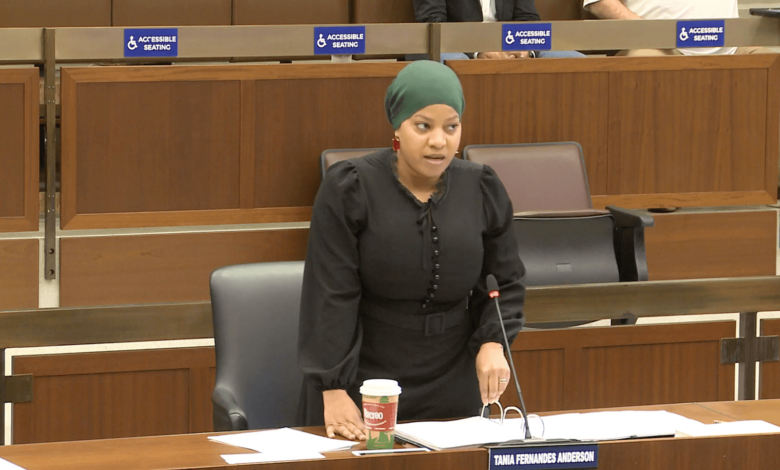Nepotism and Ethical Standards in Boston’s City Government: A Closer Look at Councilor Tania Fernandes Anderson’s Actions

Introduction
Nepotism and ethical misconduct in government have long been a cause for concern. The recent admission by Boston City Councilor Tania Fernandes Anderson of violating conflict of interest laws by hiring her family members to work on her staff has once again brought these issues to the forefront. This article explores the implications of Anderson’s actions, the wider context of nepotism and conflicts of interest in Boston’s city government, and the need for greater accountability among public officials.
Background: A Family Affair
Tania Fernandes Anderson, a prominent member of Boston’s City Council, found herself in hot water when it came to light that she had hired her sister and son to work on her staff, a move that appeared to violate state nepotism laws. Furthermore, Anderson’s actions also breached conflict of interest regulations. These laws exist to prevent public officials from making decisions that could personally benefit them or their close relatives.
Following the revelations, Anderson took responsibility for her actions and agreed to pay a $5,000 civil penalty as a form of reparation. She asserted that the hiring of her family members was an “honest mistake” and promptly terminated their employment upon becoming aware of the violation.
Implications: The Perils of Nepotism
Anderson’s actions have raised serious concerns about nepotism and ethical standards within Boston’s city government. Nepotism, which is the practice of showing favoritism to family members in matters of hiring and promotions, can create a breeding ground for corruption and undermine the public’s trust in government officials. When family ties influence important decisions, it can lead to compromised outcomes that are not in the best interest of the community.
While Anderson’s admission of guilt and willingness to pay a civil penalty might mitigate the damage to her reputation, critics argue that a mere financial penalty might not be enough to deter others from engaging in similar practices. The consequences of nepotism can be far-reaching and may harm the overall effectiveness of governance.
Context: A Wider Problem
Anderson’s case is not an isolated incident. Nepotism and conflicts of interest are pervasive issues that have plagued government institutions at all levels for decades. The practice of hiring family members or close associates in public offices is seen in various domains, from local governments to federal agencies. These actions often go unnoticed or unaddressed, which contributes to the perception that public officials are not held accountable for their unethical conduct.
Nepotism in government has deep historical roots, and the issue is not unique to Boston. Various studies have shown that nepotism remains a significant challenge in many countries and is associated with negative consequences such as reduced meritocracy, decreased public trust, and diminished efficiency in public administration.
Journalistic Opportunity: Investigating Further
Anderson’s case serves as an important point of investigation for journalists to delve deeper into the issue of nepotism and conflicts of interest within Boston’s city government. A thorough examination could shed light on other instances where public officials have engaged in similar practices, possibly implicating multiple individuals and exposing systemic failures.
By conducting in-depth research and interviews, journalists can bring to light the broader implications of nepotism on the functioning of government institutions and the public’s perception of the officials elected to serve them. This investigation may act as a catalyst for initiating policy changes, pushing for more stringent ethics regulations, and increasing transparency and accountability in the hiring practices of public offices.
Furthermore, journalists can explore the potential impact of nepotism on diversity and inclusion in the public sector. When positions are filled through nepotistic means, it can limit opportunities for qualified individuals from diverse backgrounds and perpetuate inequalities within the workforce.
Addressing the Root Causes: Building Ethical Government
To tackle the pervasive issue of nepotism and conflicts of interest, a comprehensive approach is necessary. Firstly, government agencies should implement robust anti-nepotism policies and provide training for public officials to raise awareness about the ethical implications of hiring family members. By promoting a culture of transparency and meritocracy, these policies can foster an environment that prioritizes qualified individuals’ fair selection.
Moreover, independent oversight bodies can be established to monitor and investigate potential cases of nepotism, ensuring that public officials are held accountable for their actions. These bodies should have the authority to conduct thorough and unbiased inquiries, serving as a crucial check on potential abuses of power.
Citizen Engagement: A Driving Force for Change
Beyond the realm of government and media, citizens’ active involvement is vital in upholding ethical standards in the city government. An informed and engaged public can demand accountability from elected officials and put pressure on them to act in the best interest of the community.
Through civic education and community forums, citizens can familiarize themselves with the importance of ethical conduct and the potential consequences of nepotism. Grassroots movements and advocacy groups can play a significant role in advocating for ethical governance and supporting measures to curtail nepotistic practices.
Conclusion: The Urgent Need for Accountability
Tania Fernandes Anderson’s acknowledgment of violating conflict of interest laws by hiring her family members to work on her staff has cast a spotlight on the pervasive issue of nepotism and ethical standards within Boston’s city government. Her actions have generated concerns about how such practices can compromise public trust and the effectiveness of governance.
However, the implications of Anderson’s actions reach beyond her individual case. Journalists have a critical role to play in investigating and exposing instances of nepotism and conflicts of interest throughout government institutions. By holding officials accountable and advocating for stricter regulations, they can contribute to a more transparent and trustworthy democratic system that genuinely serves the interests of the public.
Furthermore, addressing nepotism requires a multi-faceted approach. Government agencies should implement robust anti-nepotism policies and provide training for public officials to raise awareness about the ethical implications of hiring family members. Independent oversight bodies can also be established to monitor and investigate potential cases of nepotism, ensuring that public officials are held accountable for their actions.
Ultimately, promoting transparency, meritocracy, and fair hiring practices is essential to building and maintaining public trust in government. By confronting nepotism and other forms of ethical misconduct head-on, Boston’s city government can pave the way for a more ethical and accountable public administration that truly serves the needs of its citizens. With the active engagement of journalists, citizens, and public officials, the path towards ethical governance can become a reality, instilling confidence in the democratic process and fostering a more just and equitable society for all.



